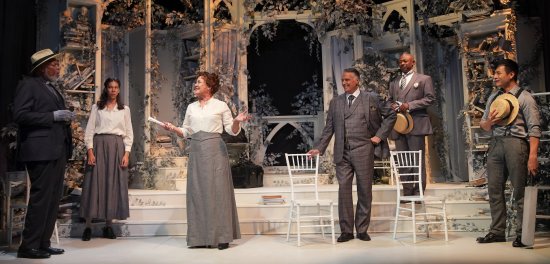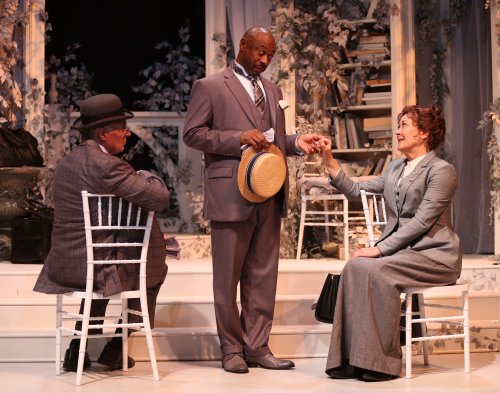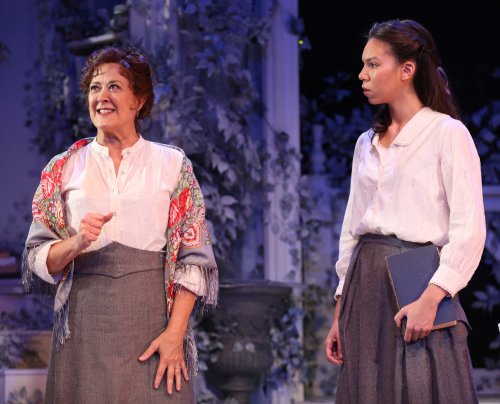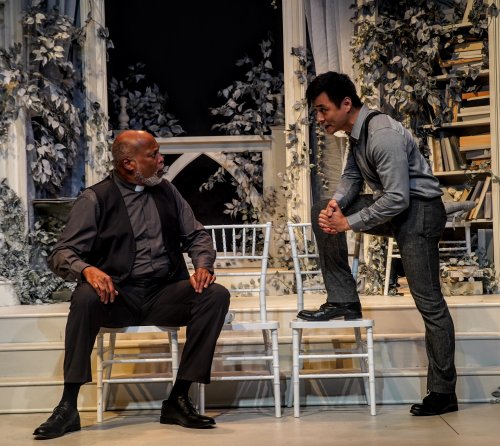Mrs. Warren’s Profession
Stylish and timely revival of Shaw’s once-banned comedy about women’s right to work in Edwardian society starring Karen Ziemba and Robert Cuccioli.

The full cast of the Gingold Theatrical Group’s revival of Shaw’s “Mrs. Warren’s Profession” now at Theatre Row; set by Brian Prather; costumes by Asa Benally (Photo credit: Carol Rosegg)
[avatar user=”Victor Gluck” size=”96″ align=”left”] Victor Gluck, Editor-in-Chief[/avatar]
George Bernard Shaw’s once-banned problem comedy due to its controversial subject matter concerning prostitution, Mrs. Warren’s Profession has been given a stylish and elegant revival by the Gingold Theatrical Group which specializes in the plays of this master. As staged by artistic director David Staller and with a cast led by Karen Ziemba and Robert Cuccioli, the play is an entertaining story investigating hypocrisy in society, mother-daughter relationship, and the rights of women. While most of the shock value has worn off since the play was first written in 1893, the play’s message is still timely and relevant. Banned from the stage for 32 years in England after it was written, the play now seems to have come into its own with previous New York revivals that have starred such legendary actresses as Ruth Gordon, Lynn Redgrave, Uta Hagen and Dana Ivey.
Now set in 1912, the date of Shaw’s first revision of the play, this Mrs. Warren’s Profession is more streamlined than the original published script and this production is performed without any intermissions. Staller has chosen to direct the play as drawing room comedy (which it is) but has scrimped on the tension and the dramatic high points which are rather important. As stylish as it is, the play seems to be all on one level even with its startling revelations. This diminishes some of the actors’ fine work, aside from their expertise with the comedy’s droll bon mots.

Robert Cuccioli, Alvin Keith and Karen Ziemba in a scene from the Gingold Theatrical Group’s production of “Mrs. Warren’s Profession” now at Theatre Row (Photo credit: Carol Rosegg)
Vivie Warren, a recent graduate of the all-women’s Newnham College, Cambridge, with a high degree in mathematics, is taking a much needed rest in Surrey after the grind of her final exams. As Vivie has always lived in boarding schools in England, she has not seen much of her mother who lives in Brussels and Vienna, nor does she know who her father was. On this beautiful summer day, she has a surprise visit from her mother Kitty, her mother’s friend the architect Praed, and her mother’s business associate Sir George Crofts. Although a pragmatist, Vivie is drawn to the artistic Praed but entirely put off by Sir George, a sporty middle-aged man-about-town.
Things take a strange turn when the Reverend Samuel Gardner appears, the father of young wastrel Frank with whom Vivie is having a flirtation, and her mother and Sir George recognizes Sam from earlier, more convivial days. After both Sir George and Frank propose, Vivie insists her mother tell her what she has wanted to know all along, but the question of her parentage remains unanswered. However, Vivie is ultimately given a lot to think about from what she hears: her mother has been the manager of a chain of high class bordellos in four cities on the continent, but has retained an air of respectability due to her wealth and connections. It is not until now that Vivie discovers the source of the money that has paid for her comforts and her schooling all these years. Though Vivie has been trained to be an actuary, her mother expects her to be a debutante and enjoy the fruits of her labor. This will lead to a battle royal between the two women.

Karen Ziemba and Nicole King in a scene from the Gingold Theatrical Group’s production of “Mrs. Warren’s Profession” now at Theatre Row (Photo credit: Carol Rosegg)
As in the manner of all Shaw, the play is dripping with irony as well as witty statements that do more than tweak respectable society. The play castigates the Edwardian England which turned a blind eye to the money investors earned from running prostitution while at the same time condemning the poor girls who worked in this trade as there are no other jobs open to them. As Crofts tells Vivie, “As long as you don’t fly openly in the face of society, society doesn’t ask any inconvenient questions. There are no secrets better kept than the secrets everybody guesses.” Earlier he had told Vivie, “If you’re going to pick and choose your acquaintances on moral principles, you’d better clear out of this country, unless you want to cut yourself off from all decent society.”
The play begins and ends with a new prologue and epilogue which makes this Vivie’s story and Nicole King makes a strong impression as the intellectual, morally ethical and matter-of-fact Vivie Warren who is able to hold her own against her forceful and equally determined mother. Ziemba makes a splash as the vivacious and domineering Mrs. Kitty Warren, used to getting her own way and with an answer for everything. She is partly undermined by Staller’s direction which does not give her any special dramatic moments even during her revelations. Cuccioli is fine as the stuffy and worldly Sir George but does not make him as vulgar or crass as the script implies. As the architect Praed, Alvin Keith is memorable as an aesthete who knows little of the world nor does he ask many questions about how it runs. Raphael Nash Thompson makes the Reverend Gardner into a comic character, while David Lee Huynh is convincing as his spendthrift son who is trying to marry for love and money as he is without any discernable career.

Raphael Nash Thompson and David Lee Huynh in a scene from the Gingold Theatrical Group’s production of “Mrs. Warren’s Profession” now at Theatre Row (Photo credit: Carol Rosegg)
The visual design is the most successful element of the production. Brian Prather’s unit set (used for all four acts) is a wall of white bookcases overgrown with plant life – also white – with a garden gate in the middle which serves as both inside and outside. The costumes by Asa Benally are in various shades of grey, with some of the men in white shirts and others in greys, while Mrs. Warren eventually adds a touch of red with a shawl and later a vest. The set symbolizes Vivie’s bookish environment while the white plant life suggests a decaying world being invaded by the natural one.
Presented as a light Edwardian comedy, David Staller’s revised version of Mrs. Warren’s Profession is excellent entertainment. However, for those who have seen the play before or know it well, it seems to have not trusted the seriousness of the material by diluting its message and theme. Nevertheless, the strong and personable cast does its utmost in keeping this 109-year-old script bubbling along. This is an excellent introduction for those who do not know the work of Bernard Shaw or his famed paradoxes.
Mrs. Warren’s Profession (streaming: June 21 – 27, 2022)
Gingold Theatrical Group
Theatre Two at Theatre Row, 410 W. 42nd Street, in Manhattan
For tickets, visit http://www.BroadwayOnDemand.com/gingold
Running time: one hour and 45 minutes with no intermission






Leave a comment